Презентация presentation for lecture Heuristics 27.11.11





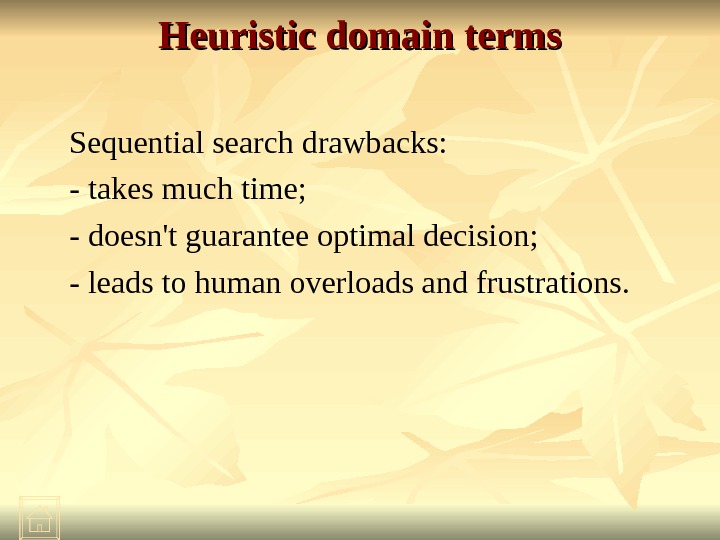



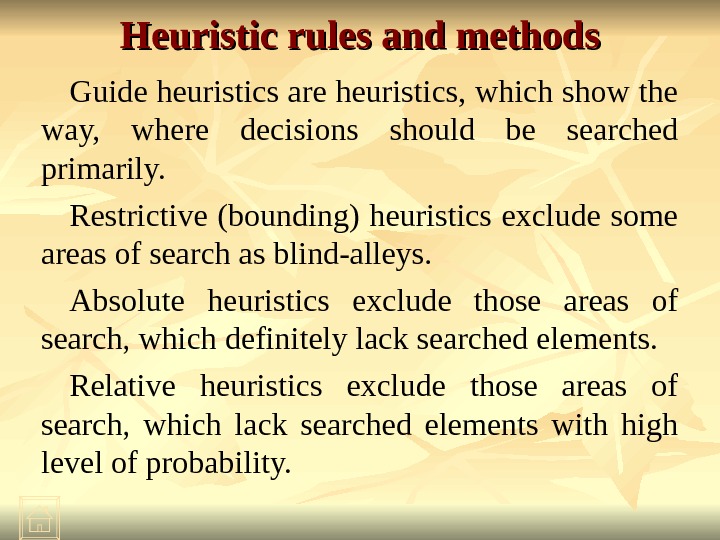
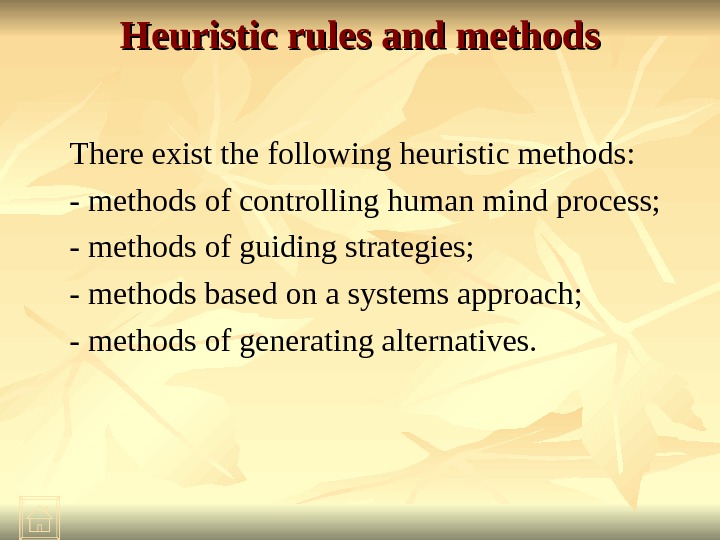
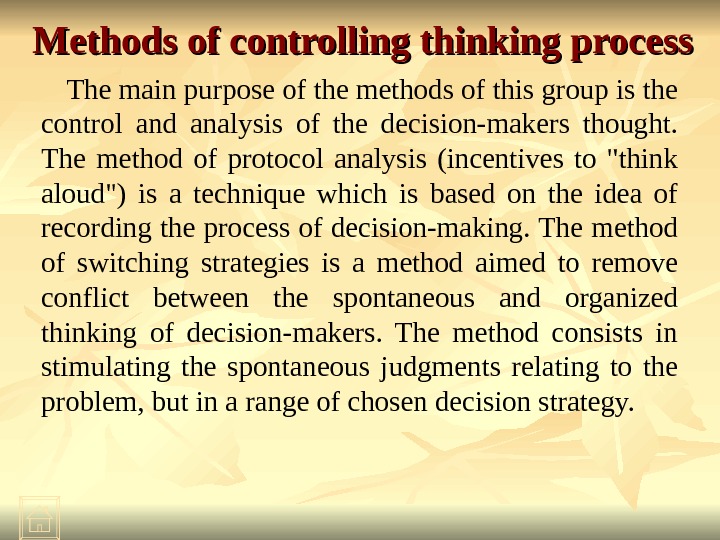
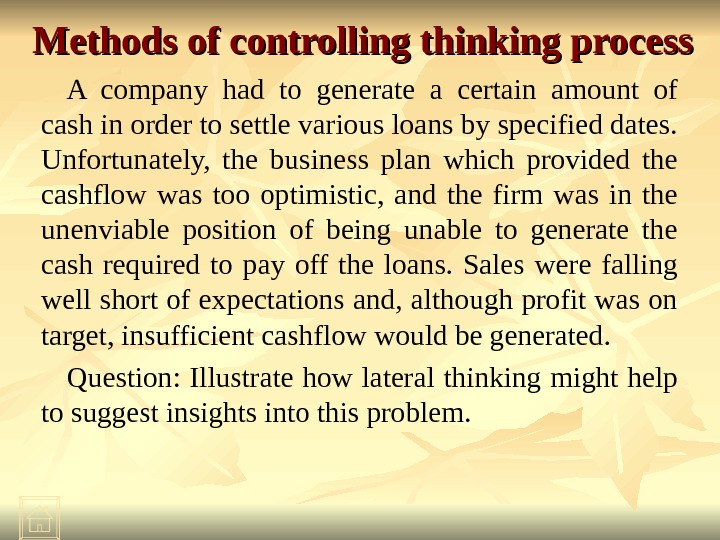

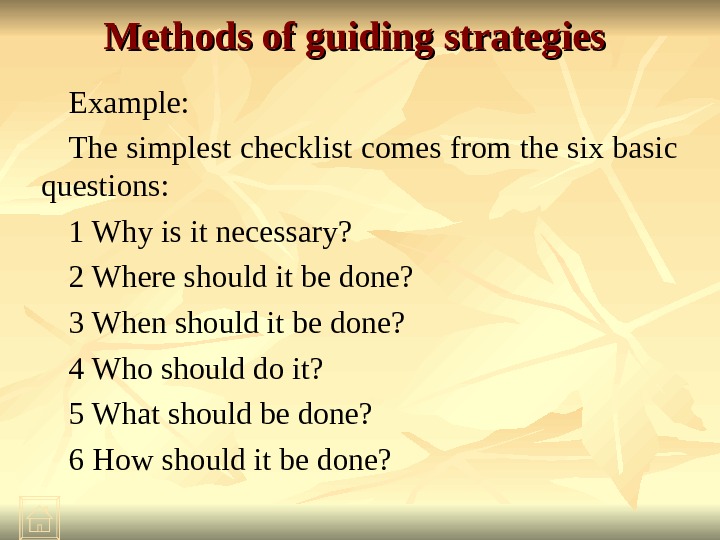
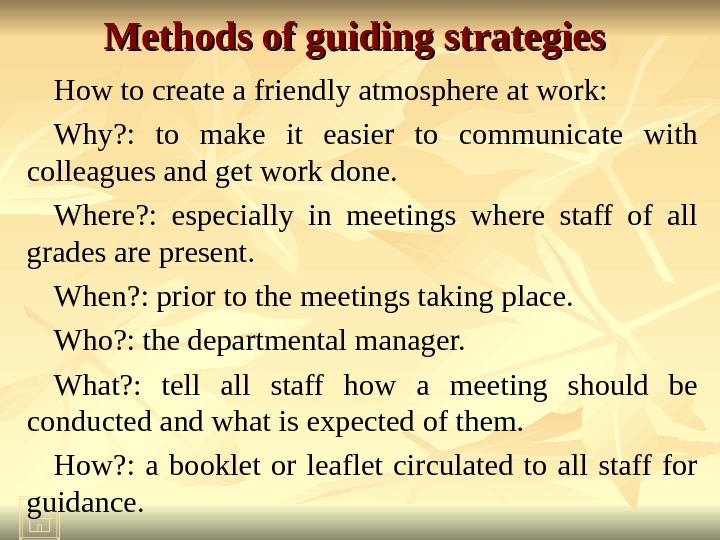
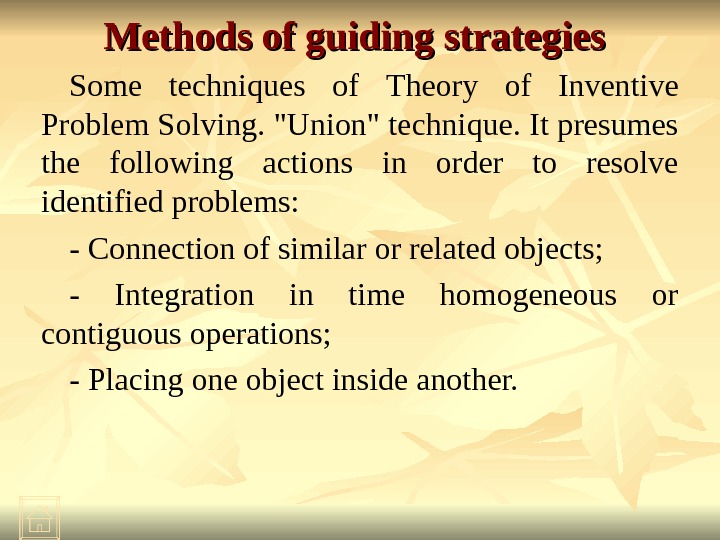
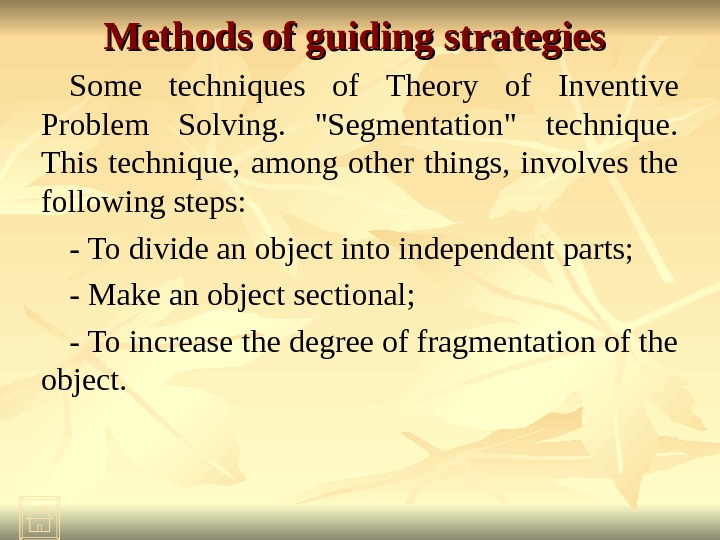
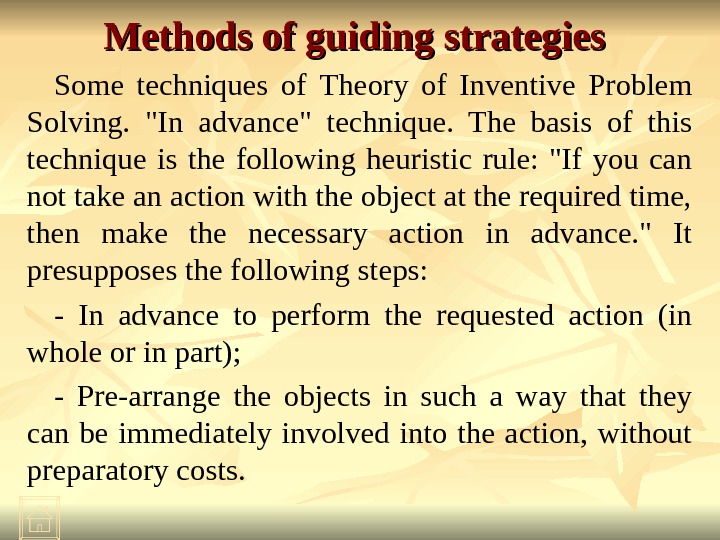
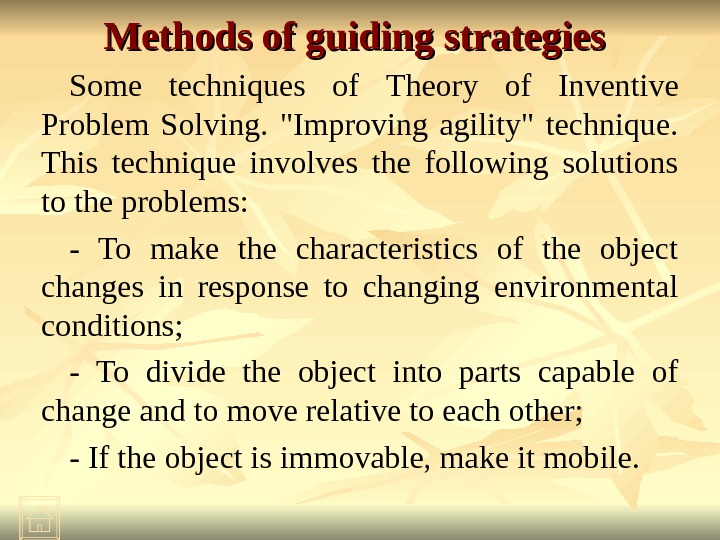


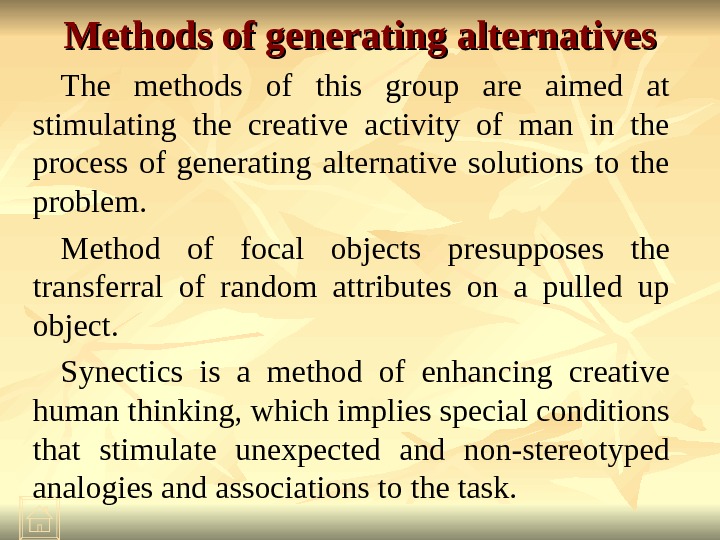
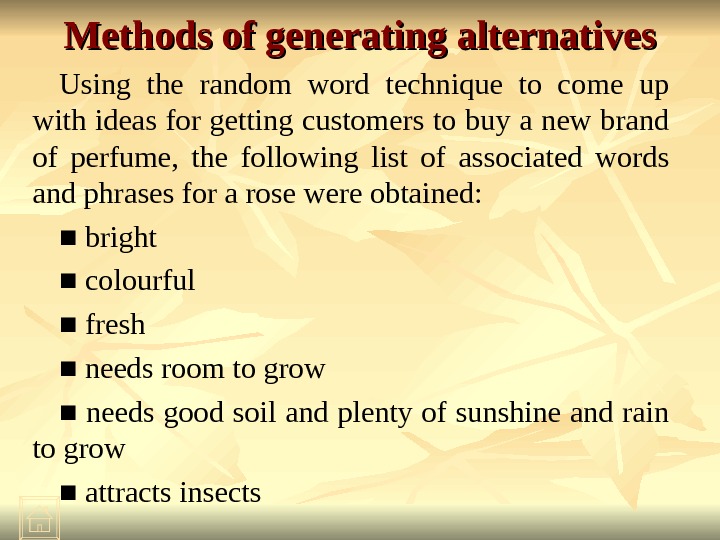
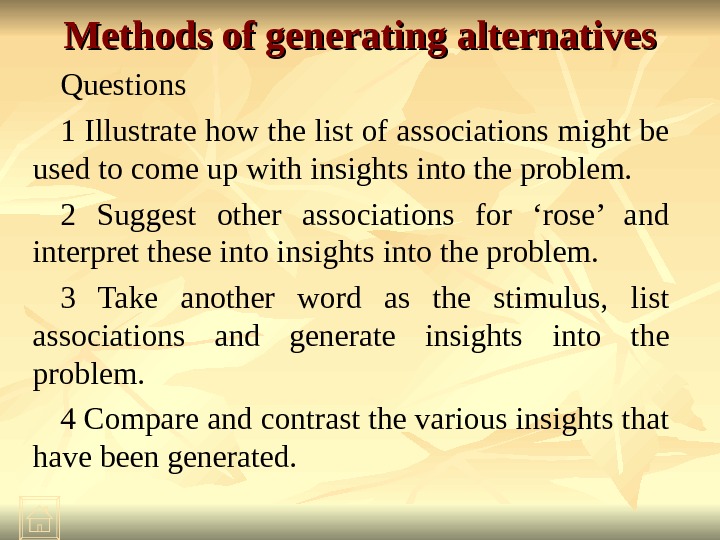
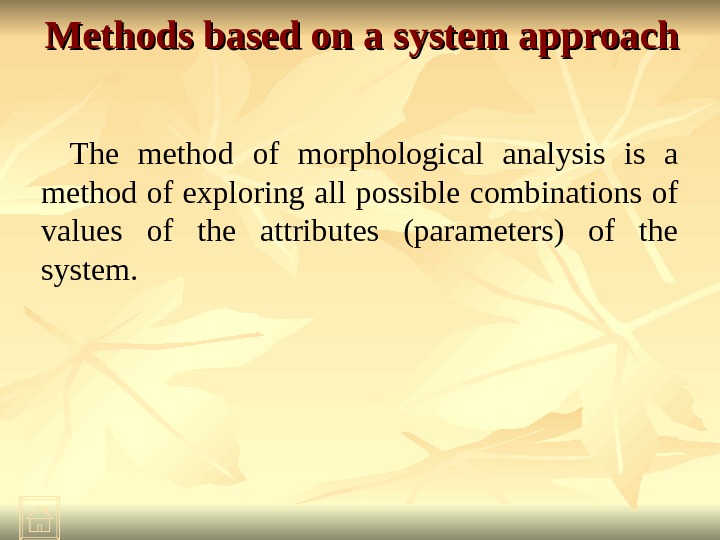


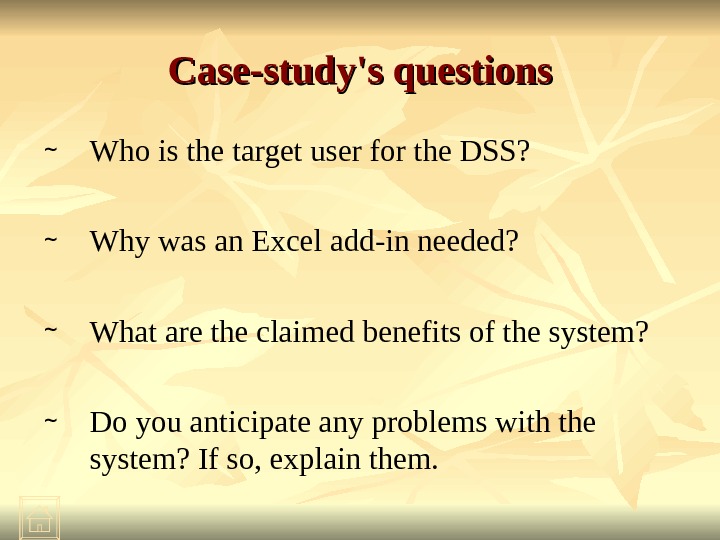

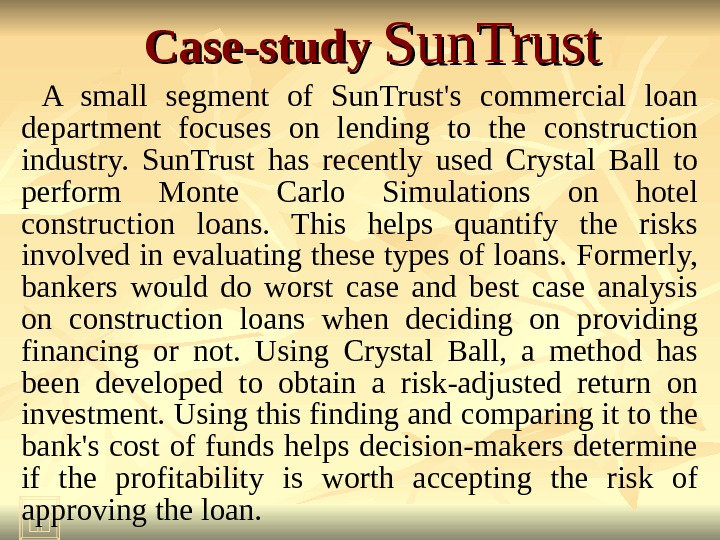
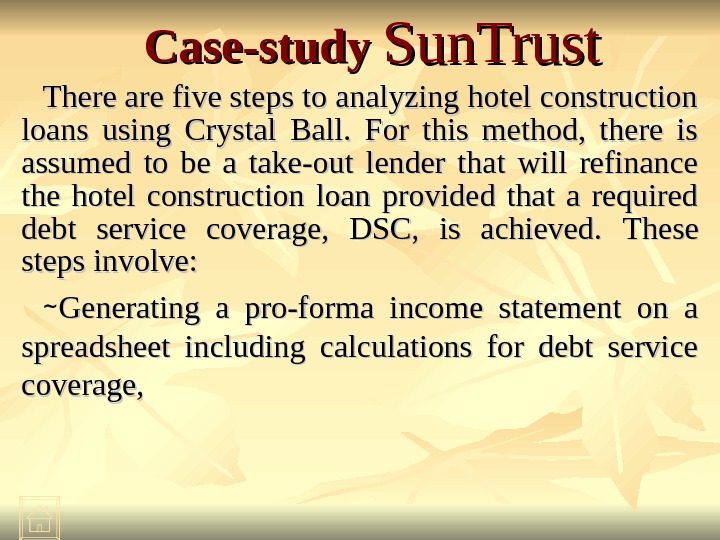


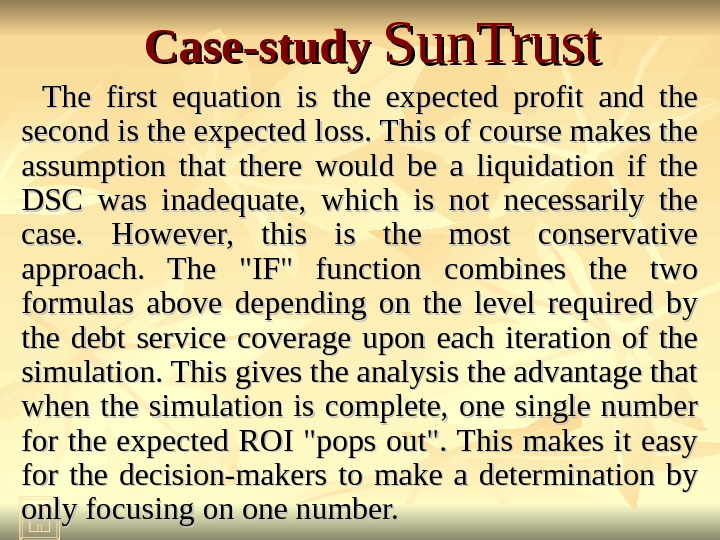

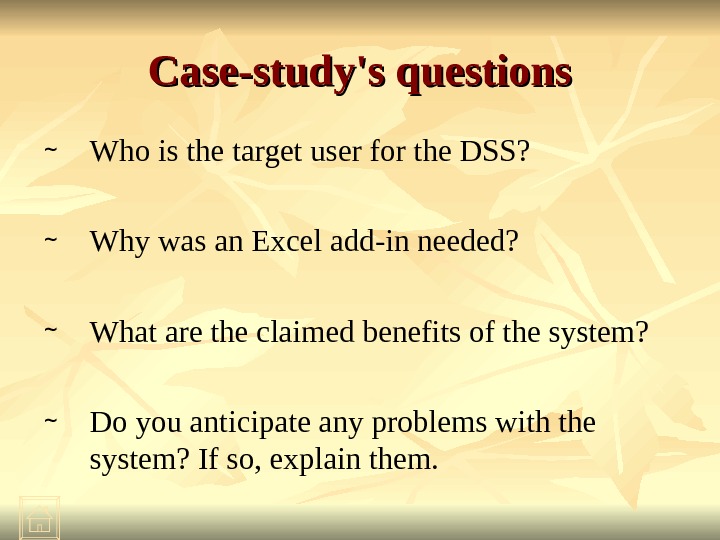


presentation_for_lecture_heuristics_27.11.11.ppt
- Размер: 181 Кб
- Количество слайдов: 38
Описание презентации Презентация presentation for lecture Heuristics 27.11.11 по слайдам
 DSSDSS by Olga Zavgorodnya. Heuristic decision support methods
DSSDSS by Olga Zavgorodnya. Heuristic decision support methods
 Content 1. Heuristic domain terms 2. Heuristic rules and methods 3. Methods of controlling human mind process 4. Methods of guiding strategies 5. Methods based on a systems approach 6. Methods of generating alternatives
Content 1. Heuristic domain terms 2. Heuristic rules and methods 3. Methods of controlling human mind process 4. Methods of guiding strategies 5. Methods based on a systems approach 6. Methods of generating alternatives
 Heuristic domain terms As we know, in adopting decisions of semi-structured problems there might be used such methods as: — analytical; — sequential searches; — heuristic searches. What are they about? What does restrict their usage?
Heuristic domain terms As we know, in adopting decisions of semi-structured problems there might be used such methods as: — analytical; — sequential searches; — heuristic searches. What are they about? What does restrict their usage?
 Heuristic domain terms Analytical methods drawbacks: — high level of reality simplification in model; — high computational demands; — narrow range of appliances; — some difficulties in model building (in defining objective function, weight of criteria, all constraints, etc. ); — found solution may be not the best solution in practice.
Heuristic domain terms Analytical methods drawbacks: — high level of reality simplification in model; — high computational demands; — narrow range of appliances; — some difficulties in model building (in defining objective function, weight of criteria, all constraints, etc. ); — found solution may be not the best solution in practice.
 Heuristic domain terms Sequential search drawbacks: — takes much time; — doesn’t guarantee optimal decision; — leads to human overloads and frustrations.
Heuristic domain terms Sequential search drawbacks: — takes much time; — doesn’t guarantee optimal decision; — leads to human overloads and frustrations.
 Heuristic domain terms There are the following meanings of heuristic: 1) that is a science, which investigates productive creative thinking; 2) that is a method of learning with the help of leading questions; 3) that is theory and practice of elective choice in difficult intellectual tasks decision; 4) that is a set of special methods and rules in discovering and investigations.
Heuristic domain terms There are the following meanings of heuristic: 1) that is a science, which investigates productive creative thinking; 2) that is a method of learning with the help of leading questions; 3) that is theory and practice of elective choice in difficult intellectual tasks decision; 4) that is a set of special methods and rules in discovering and investigations.
 Heuristic rules and methods have the following specific properties: — They are widely used in solving problems, which do not have algorithms that guarantee finding the «right decision»; — They leave wide latitude for the manifestation of creative activity of man; — They do not guarantee ‘positive’ results, though it is generally possible to obtain better results than without their usage.
Heuristic rules and methods have the following specific properties: — They are widely used in solving problems, which do not have algorithms that guarantee finding the «right decision»; — They leave wide latitude for the manifestation of creative activity of man; — They do not guarantee ‘positive’ results, though it is generally possible to obtain better results than without their usage.
 Heuristic rules and methods Examples of heuristic rules: 1. First, check the entire site, and only then proceed with the check of its components. 2. Cheap parts should be checked at first, and more expensive afterwards. 3. The units that have the same customers (competitors), and shared resources, should maintain a centralized competitive intelligence. 4. If you want to remove the harmful effect of an object or process, look in favor of harm.
Heuristic rules and methods Examples of heuristic rules: 1. First, check the entire site, and only then proceed with the check of its components. 2. Cheap parts should be checked at first, and more expensive afterwards. 3. The units that have the same customers (competitors), and shared resources, should maintain a centralized competitive intelligence. 4. If you want to remove the harmful effect of an object or process, look in favor of harm.
 Heuristic rules and methods Guide heuristics are heuristics, which show the way, where decisions should be searched primarily. Restrictive (bounding) heuristics exclude some areas of search as blind-alleys. Absolute heuristics exclude those areas of search, which definitely lack searched elements. Relative heuristics exclude those areas of search, which lack searched elements with high level of probability.
Heuristic rules and methods Guide heuristics are heuristics, which show the way, where decisions should be searched primarily. Restrictive (bounding) heuristics exclude some areas of search as blind-alleys. Absolute heuristics exclude those areas of search, which definitely lack searched elements. Relative heuristics exclude those areas of search, which lack searched elements with high level of probability.
 Heuristic rules and methods There exist the following heuristic methods: — methods of controlling human mind process; — methods of guiding strategies; — methods based on a systems approach; — methods of generating alternatives.
Heuristic rules and methods There exist the following heuristic methods: — methods of controlling human mind process; — methods of guiding strategies; — methods based on a systems approach; — methods of generating alternatives.
 Methods of controlling thinking process The main purpose of the methods of this group is the control and analysis of the decision-makers thought. The method of protocol analysis (incentives to «think aloud») is a technique which is based on the idea of recording the process of decision-making. The method of switching strategies is a method aimed to remove conflict between the spontaneous and organized thinking of decision-makers. The method consists in stimulating the spontaneous judgments relating to the problem, but in a range of chosen decision strategy.
Methods of controlling thinking process The main purpose of the methods of this group is the control and analysis of the decision-makers thought. The method of protocol analysis (incentives to «think aloud») is a technique which is based on the idea of recording the process of decision-making. The method of switching strategies is a method aimed to remove conflict between the spontaneous and organized thinking of decision-makers. The method consists in stimulating the spontaneous judgments relating to the problem, but in a range of chosen decision strategy.
 Methods of controlling thinking process A company had to generate a certain amount of cash in order to settle various loans by specified dates. Unfortunately, the business plan which provided the cashflow was too optimistic, and the firm was in the unenviable position of being unable to generate the cash required to pay off the loans. Sales were falling well short of expectations and, although profit was on target, insufficient cashflow would be generated. Question: Illustrate how lateral thinking might help to suggest insights into this problem.
Methods of controlling thinking process A company had to generate a certain amount of cash in order to settle various loans by specified dates. Unfortunately, the business plan which provided the cashflow was too optimistic, and the firm was in the unenviable position of being unable to generate the cash required to pay off the loans. Sales were falling well short of expectations and, although profit was on target, insufficient cashflow would be generated. Question: Illustrate how lateral thinking might help to suggest insights into this problem.
 Methods of guiding strategies The methods of this group are intended to guide heuristics with various decision-makers to encourage the efficient way of solving the problem. Method of checklists is the method of psychological activation of the creative process, which leads a person to problem solving by using leading questions. Theory of Inventive Problem Solving is a methodology of finding solutions to problems by scientific and technical creativity
Methods of guiding strategies The methods of this group are intended to guide heuristics with various decision-makers to encourage the efficient way of solving the problem. Method of checklists is the method of psychological activation of the creative process, which leads a person to problem solving by using leading questions. Theory of Inventive Problem Solving is a methodology of finding solutions to problems by scientific and technical creativity
 Methods of guiding strategies Example: The simplest checklist comes from the six basic questions: 1 Why is it necessary? 2 Where should it be done? 3 When should it be done? 4 Who should do it? 5 What should be done? 6 How should it be done?
Methods of guiding strategies Example: The simplest checklist comes from the six basic questions: 1 Why is it necessary? 2 Where should it be done? 3 When should it be done? 4 Who should do it? 5 What should be done? 6 How should it be done?
 Methods of guiding strategies How to create a friendly atmosphere at work: Why? : to make it easier to communicate with colleagues and get work done. Where? : especially in meetings where staff of all grades are present. When? : prior to the meetings taking place. Who? : the departmental manager. What? : tell all staff how a meeting should be conducted and what is expected of them. How? : a booklet or leaflet circulated to all staff for guidance.
Methods of guiding strategies How to create a friendly atmosphere at work: Why? : to make it easier to communicate with colleagues and get work done. Where? : especially in meetings where staff of all grades are present. When? : prior to the meetings taking place. Who? : the departmental manager. What? : tell all staff how a meeting should be conducted and what is expected of them. How? : a booklet or leaflet circulated to all staff for guidance.
 Methods of guiding strategies Some techniques of Theory of Inventive Problem Solving. «Union» technique. It presumes the following actions in order to resolve identified problems: — Connection of similar or related objects; — Integration in time homogeneous or contiguous operations; — Placing one object inside another.
Methods of guiding strategies Some techniques of Theory of Inventive Problem Solving. «Union» technique. It presumes the following actions in order to resolve identified problems: — Connection of similar or related objects; — Integration in time homogeneous or contiguous operations; — Placing one object inside another.
 Methods of guiding strategies Some techniques of Theory of Inventive Problem Solving. «Segmentation» technique. This technique, among other things, involves the following steps: — To divide an object into independent parts; — Make an object sectional; — To increase the degree of fragmentation of the object.
Methods of guiding strategies Some techniques of Theory of Inventive Problem Solving. «Segmentation» technique. This technique, among other things, involves the following steps: — To divide an object into independent parts; — Make an object sectional; — To increase the degree of fragmentation of the object.
 Methods of guiding strategies Some techniques of Theory of Inventive Problem Solving. «In advance» technique. The basis of this technique is the following heuristic rule: «If you can not take an action with the object at the required time, then make the necessary action in advance. » It presupposes the following steps: — In advance to perform the requested action (in whole or in part); — Pre-arrange the objects in such a way that they can be immediately involved into the action, without preparatory costs.
Methods of guiding strategies Some techniques of Theory of Inventive Problem Solving. «In advance» technique. The basis of this technique is the following heuristic rule: «If you can not take an action with the object at the required time, then make the necessary action in advance. » It presupposes the following steps: — In advance to perform the requested action (in whole or in part); — Pre-arrange the objects in such a way that they can be immediately involved into the action, without preparatory costs.
 Methods of guiding strategies Some techniques of Theory of Inventive Problem Solving. «Improving agility» technique. This technique involves the following solutions to the problems: — To make the characteristics of the object changes in response to changing environmental conditions; — To divide the object into parts capable of change and to move relative to each other; — If the object is immovable, make it mobile.
Methods of guiding strategies Some techniques of Theory of Inventive Problem Solving. «Improving agility» technique. This technique involves the following solutions to the problems: — To make the characteristics of the object changes in response to changing environmental conditions; — To divide the object into parts capable of change and to move relative to each other; — If the object is immovable, make it mobile.
 Methods of guiding strategies Some techniques of Theory of Inventive Problem Solving. «Zoom» technique. This technique involves the following steps: — Change the real scale of the system; — Change the scale of the nominal system. «On the contrary» technique. It offers the following: — Instead of the usual steps to make the inverse (opposite) effect; — Rotate the object «upside down», turn it.
Methods of guiding strategies Some techniques of Theory of Inventive Problem Solving. «Zoom» technique. This technique involves the following steps: — Change the real scale of the system; — Change the scale of the nominal system. «On the contrary» technique. It offers the following: — Instead of the usual steps to make the inverse (opposite) effect; — Rotate the object «upside down», turn it.
 Methods of guiding strategies Some techniques of Theory of Inventive Problem Solving. «Copy» technique. The basis of this technique implies the following heuristic rule: «If it is difficult or not possible to implement, the necessary actions with the object, it is advisable to use a copy of it». — To replace the inaccessible, complex, expensive object by its simplified and cheap copy; — To replace the object by its optical copy image.
Methods of guiding strategies Some techniques of Theory of Inventive Problem Solving. «Copy» technique. The basis of this technique implies the following heuristic rule: «If it is difficult or not possible to implement, the necessary actions with the object, it is advisable to use a copy of it». — To replace the inaccessible, complex, expensive object by its simplified and cheap copy; — To replace the object by its optical copy image.
 Methods of generating alternatives The methods of this group are aimed at stimulating the creative activity of man in the process of generating alternative solutions to the problem. Method of focal objects presupposes the transferral of random attributes on a pulled up object. Synectics is a method of enhancing creative human thinking, which implies special conditions that stimulate unexpected and non-stereotyped analogies and associations to the task.
Methods of generating alternatives The methods of this group are aimed at stimulating the creative activity of man in the process of generating alternative solutions to the problem. Method of focal objects presupposes the transferral of random attributes on a pulled up object. Synectics is a method of enhancing creative human thinking, which implies special conditions that stimulate unexpected and non-stereotyped analogies and associations to the task.
 Methods of generating alternatives Using the random word technique to come up with ideas for getting customers to buy a new brand of perfume, the following list of associated words and phrases for a rose were obtained: ■ bright ■ colourful ■ fresh ■ needs room to grow ■ needs good soil and plenty of sunshine and rain to grow ■ attracts insects
Methods of generating alternatives Using the random word technique to come up with ideas for getting customers to buy a new brand of perfume, the following list of associated words and phrases for a rose were obtained: ■ bright ■ colourful ■ fresh ■ needs room to grow ■ needs good soil and plenty of sunshine and rain to grow ■ attracts insects
 Methods of generating alternatives Questions 1 Illustrate how the list of associations might be used to come up with insights into the problem. 2 Suggest other associations for ‘rose’ and interpret these into insights into the problem. 3 Take another word as the stimulus, list associations and generate insights into the problem. 4 Compare and contrast the various insights that have been generated.
Methods of generating alternatives Questions 1 Illustrate how the list of associations might be used to come up with insights into the problem. 2 Suggest other associations for ‘rose’ and interpret these into insights into the problem. 3 Take another word as the stimulus, list associations and generate insights into the problem. 4 Compare and contrast the various insights that have been generated.
 Methods based on a system approach The method of morphological analysis is a method of exploring all possible combinations of values of the attributes (parameters) of the system.
Methods based on a system approach The method of morphological analysis is a method of exploring all possible combinations of values of the attributes (parameters) of the system.

 Case-study Sun. Trust «Banks» on Crystal Ball for assessing the risk of commercial loans Author: Lawrence Goldman (November 1998)
Case-study Sun. Trust «Banks» on Crystal Ball for assessing the risk of commercial loans Author: Lawrence Goldman (November 1998)
 Case-study’s questions ~ Who is the target user for the DSS? ~ Why was an Excel add-in needed? ~ What are the claimed benefits of the system? ~ Do you anticipate any problems with the system? If so, explain them.
Case-study’s questions ~ Who is the target user for the DSS? ~ Why was an Excel add-in needed? ~ What are the claimed benefits of the system? ~ Do you anticipate any problems with the system? If so, explain them.
 Case-study Sun. Trust Banks , Inc. , is a premier financial services company based in the Southeastern United States. Sun. Trust provides a wide range of services to meet the financial needs of its growing customer base through approximately 700 full-service banking offices in Florida, Georgia, Tennessee and Alabama. Sun. Trust’s primary businesses include traditional deposit and credit services as well as trust and investment services. Through various subsidiaries the Company provides credit cards, mortgage banking, credit-related insurance, data processing and information services, discount brokerage and investment banking services.
Case-study Sun. Trust Banks , Inc. , is a premier financial services company based in the Southeastern United States. Sun. Trust provides a wide range of services to meet the financial needs of its growing customer base through approximately 700 full-service banking offices in Florida, Georgia, Tennessee and Alabama. Sun. Trust’s primary businesses include traditional deposit and credit services as well as trust and investment services. Through various subsidiaries the Company provides credit cards, mortgage banking, credit-related insurance, data processing and information services, discount brokerage and investment banking services.
 Case-study Sun. Trust A small segment of Sun. Trust’s commercial loan department focuses on lending to the construction industry. Sun. Trust has recently used Crystal Ball to perform Monte Carlo Simulations on hotel construction loans. This helps quantify the risks involved in evaluating these types of loans. Formerly, bankers would do worst case and best case analysis on construction loans when deciding on providing financing or not. Using Crystal Ball, a method has been developed to obtain a risk-adjusted return on investment. Using this finding and comparing it to the bank’s cost of funds helps decision-makers determine if the profitability is worth accepting the risk of approving the loan.
Case-study Sun. Trust A small segment of Sun. Trust’s commercial loan department focuses on lending to the construction industry. Sun. Trust has recently used Crystal Ball to perform Monte Carlo Simulations on hotel construction loans. This helps quantify the risks involved in evaluating these types of loans. Formerly, bankers would do worst case and best case analysis on construction loans when deciding on providing financing or not. Using Crystal Ball, a method has been developed to obtain a risk-adjusted return on investment. Using this finding and comparing it to the bank’s cost of funds helps decision-makers determine if the profitability is worth accepting the risk of approving the loan.
 Case-study Sun. Trust There are five steps to analyzing hotel construction loans using Crystal Ball. For this method, there is assumed to be a take-out lender that will refinance the hotel construction loan provided that a required debt service coverage, DSC, is achieved. These steps involve: ~ Generating a pro-forma income statement on a spreadsheet including calculations for debt service coverage,
Case-study Sun. Trust There are five steps to analyzing hotel construction loans using Crystal Ball. For this method, there is assumed to be a take-out lender that will refinance the hotel construction loan provided that a required debt service coverage, DSC, is achieved. These steps involve: ~ Generating a pro-forma income statement on a spreadsheet including calculations for debt service coverage,
 Case-study Sun. Trust ~ Assign probability distribution functions to the average daily rate obtainable by the hotel, average occupancy rate of the hotel and the projected floating interest rate on the loan, ~ Run the simulation to determine the probability that the DSC will fall within the level required by the take-out lender, ~ Calculate the expected return on investment, and ~ Compare the calculated ROI with the cost of funds to determine if the spread is large enough to warrant accepting the loan.
Case-study Sun. Trust ~ Assign probability distribution functions to the average daily rate obtainable by the hotel, average occupancy rate of the hotel and the projected floating interest rate on the loan, ~ Run the simulation to determine the probability that the DSC will fall within the level required by the take-out lender, ~ Calculate the expected return on investment, and ~ Compare the calculated ROI with the cost of funds to determine if the spread is large enough to warrant accepting the loan.
 Case-study Sun. Trust Of the above steps, step 4 requires further explanation. In calculating the expected return on investment the spreadsheet «IF» function was utilized. For the cell calculating the expected return, the following equation was used: E{R} = (Loan Amount) x Interest Rate if the DSC was greater than that required by the take-out lender, and E{R} = Liquidation Value — Loan Amount if the DSC failed to meet requirements.
Case-study Sun. Trust Of the above steps, step 4 requires further explanation. In calculating the expected return on investment the spreadsheet «IF» function was utilized. For the cell calculating the expected return, the following equation was used: E{R} = (Loan Amount) x Interest Rate if the DSC was greater than that required by the take-out lender, and E{R} = Liquidation Value — Loan Amount if the DSC failed to meet requirements.
 Case-study Sun. Trust The first equation is the expected profit and the second is the expected loss. This of course makes the assumption that there would be a liquidation if the DSC was inadequate, which is not necessarily the case. However, this is the most conservative approach. The «IF» function combines the two formulas above depending on the level required by the debt service coverage upon each iteration of the simulation. This gives the analysis the advantage that when the simulation is complete, one single number for the expected ROI «pops out». This makes it easy for the decision-makers to make a determination by only focusing on one number.
Case-study Sun. Trust The first equation is the expected profit and the second is the expected loss. This of course makes the assumption that there would be a liquidation if the DSC was inadequate, which is not necessarily the case. However, this is the most conservative approach. The «IF» function combines the two formulas above depending on the level required by the debt service coverage upon each iteration of the simulation. This gives the analysis the advantage that when the simulation is complete, one single number for the expected ROI «pops out». This makes it easy for the decision-makers to make a determination by only focusing on one number.
 Case-study Sun. Trust Crystal Ball 2000 is an easy-to-use simulation program that helps users analyze the risks and uncertainties associated with specific Microsoft Excel spreadsheet models. Excel models are deterministic, which means that the inputs are fixed (one value to one cell). You can only see one solution at a time. If you want to view alternative results, you need to manually change the inputs in the model. Simulation is a way to quickly generate and analyze many possible results. To run a simulation within Excel, you need an add-in program like Crystal Ball.
Case-study Sun. Trust Crystal Ball 2000 is an easy-to-use simulation program that helps users analyze the risks and uncertainties associated with specific Microsoft Excel spreadsheet models. Excel models are deterministic, which means that the inputs are fixed (one value to one cell). You can only see one solution at a time. If you want to view alternative results, you need to manually change the inputs in the model. Simulation is a way to quickly generate and analyze many possible results. To run a simulation within Excel, you need an add-in program like Crystal Ball.
 Case-study’s questions ~ Who is the target user for the DSS? ~ Why was an Excel add-in needed? ~ What are the claimed benefits of the system? ~ Do you anticipate any problems with the system? If so, explain them.
Case-study’s questions ~ Who is the target user for the DSS? ~ Why was an Excel add-in needed? ~ What are the claimed benefits of the system? ~ Do you anticipate any problems with the system? If so, explain them.
 Case-study’s questions Do you anticipate any problems with the system? If so, explain them. ~ one figure doesn’t give a transit point (we should turn over figures in spite of seeing the transit point at once) ~ probability is overlooked ~ too little factors are in this model
Case-study’s questions Do you anticipate any problems with the system? If so, explain them. ~ one figure doesn’t give a transit point (we should turn over figures in spite of seeing the transit point at once) ~ probability is overlooked ~ too little factors are in this model
 The end : ): )
The end : ): )

